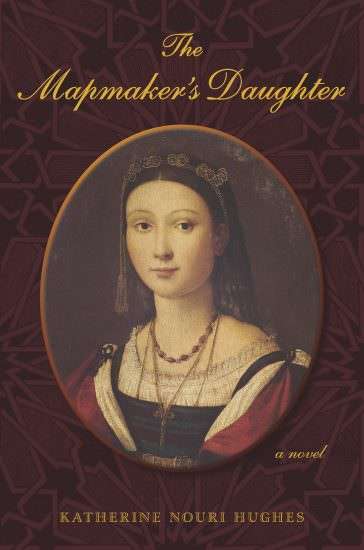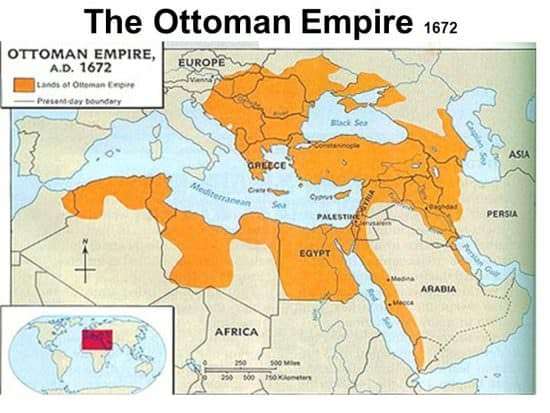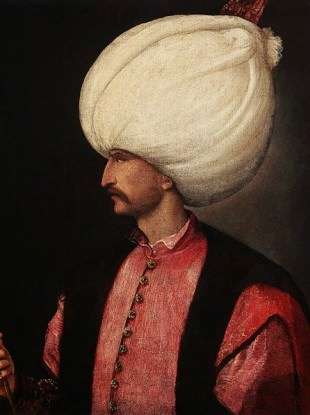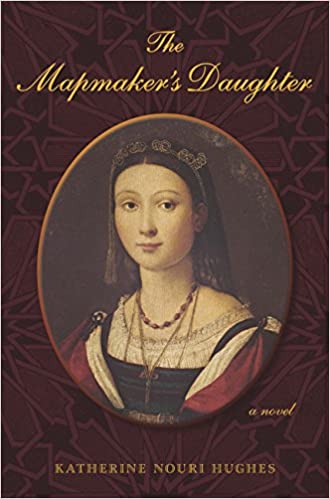The Mapmaker's Daughter

In her debut novel, The Mapmaker’s Daughter (Delphinium Books), Katherine Nouri Hughes gives insight into the historical tale of Cecilia Baflo Veniero, later known as Nurbanu, Queen Mother of the Ottoman Sultans. In a dramatic deathbed confessional, Nurbanu recounts a tragic life story from her beginnings as an illegitimately born child who was abandoned by both parents despite being given both the advantages of her mother’s intellect and her father’s nobility. Her relationship with Suleiman the Magnificent and the birth of their two sons provided Nurbanu with a position of power she had never experienced in her previous life as an orphan. Nurbanu uses her new influence to impact the national leadership and to protect her family’s position and control over the Ottoman Empire upon Suleiman’s death.
A skillfully woven story that draws from historical facts, Hughes’ grasp of the main character reads more like a biographical account of history as opposed to a fictional one. Tapping into the psyche of a woman during a time when women were not given such an extensive amount of control, The Mapmaker’s Daughter gives readers an exclusive glimpse into the mind of a woman whose story is often overshadowed by that of her husband and his legacy.
BookTrib spoke with Hughes about the book, the role of women in the Ottoman Empire and how writing this book marked the beginning of a new chapter in her own story.
 BookTrib: Pulitzer-Prize winning novelist Richard Ford said about The Mapmaker’s Daughter: “Voice — the great, elusive necessity in all historical fiction — is rapturous and irresistible in The Mapmaker’s Daughter. Katherine Hughes’s novel just seems to talk to us, and in so doing makes these titanic events seem human and natural, and thus all the more preoccupying. A very impressive book, indeed.” Tell us more about finding Nurbanu’s voice and the process it took for you to claim that for her and tell her story— although a fictional account— so vividly.
BookTrib: Pulitzer-Prize winning novelist Richard Ford said about The Mapmaker’s Daughter: “Voice — the great, elusive necessity in all historical fiction — is rapturous and irresistible in The Mapmaker’s Daughter. Katherine Hughes’s novel just seems to talk to us, and in so doing makes these titanic events seem human and natural, and thus all the more preoccupying. A very impressive book, indeed.” Tell us more about finding Nurbanu’s voice and the process it took for you to claim that for her and tell her story— although a fictional account— so vividly.
Hughes: I wanted to capture the most authentic expression of what she was wrangling with at that time. There is a very unique voice that was found in this book and finding it didn’t happen over a short period of time. It took a long time for me to just really grasp who she was. To start, I spent two years doing nothing but reading. I read everything I could. Then I spent another two years traveling and exploring, really trying to feel who she was. There were many, many drafts, but as I got used to to her, the story emerged. The direction became clearer as the story became clearer. Once I knew where the story was going to go, finding her tone and words were a matter of me letting go, sitting still when I got stuck. I put myself into what she was going through and in doing that, it was no longer me telling her story, but Nurbanu expressing herself and explaining to herself things she hadn’t really thought too much about until this deathbed account of her life.
BookTrib: Nurbnu was very involved politically, not just in the Ottoman regime, but she was very instrumental in advocating for herself at a time when women leaders were rare. How do you see her influence and activism then as it relates to women today, primarily in the Middle East and in female political figures today, in general?
Hughes: There were a lot of immensely powerful women during Nurbanu’s time, it was just a different kind of power. People thought her mother was a sorceress, so there was a power that came with that, but it was steeped in fear. A lot of her power came from being Venetian nobility by birth and she made the most of that power. But, after she married Suleiman, and gave him two sons, she had even more power and was able to use that to her advantage. Women’s voices are systematically suppressed in a large part of the world and in many places, particularly in the past, the focus was on producing as many sons as possible in order to protect the throne and make sure there was always someone who would be heir.
Suleiman recognizes Nurbanu’s strength and when he needs someone to carry out his final wishes in terms of keeping the rule of the Empire, he turns to her because she’s stronger than the sons she bore and she is more educated. He also recognizes that he needs her to trust him and goes about making her trust him. He identifies a weakness within her and goes at like a laser. Nurbanu was intent on changing and making things more sane for the regime as they were on the brink of a civil war. Women do this. Peacemaking is something women engage in and men often don’t. We’re fortunate in that way.
BookTrib: When you decided you wanted to write a book, what made you choose this particular time period as the focus?
Hughes: The Ottoman Empire was one of the world’s really great empires. It accounted for some really important developments: codes of law, science, printing at the very early stages, Jewish acceptance, enlightenment in the arts, sciences and navigation. But there were also some very disturbing elements like eliminating fraternal contenders. It’s ghastly to think about the elimination of bothers, little boys, and this all happened in public. This was actually the task that Suleiman gives to Nurbanu to make sure it [his regime] will carry on when he’s gone. He was concerned that his sons and grandsons were too humane to do so.

BookTrib: How has your life changed during and after writing this book?
Hughes: Nurbanu’s 58 and sick when she decides to figure out what made her do the really important things in her life. She’s thinking back and asking herself, “I know I did that for valid important reasons, but why?” I wasn’t a grandmother when I started writing this, but was by the time I finished it. Writing this, this is the phase in my life, where I believe I have changed the most. All of these things, going through being an empty-nester, losing my husband, becoming a grandmother have all influenced how I handled Nurbanu. I am a human being and a lot has happened to me so there’s no way it wouldn’t find its way in to the book.
BookTrib: You put a lot of yourself and your experiences into this book, so you must have a character that you find most intriguing, right?
Hughes: Suleiman and Nurbanu, but mostly Suleiman. He was incredibly interesting, complex and contradictory. He was also really brave and a lot is known about him. He led his people into battle himself when most rulers would not have done that. He campaigned a vision with endless energy that was also governed by fear of being toppled by one of his sons. He had a close male companion with whom he had a sexual relationship and had him strangled. He could be ruthless, but then there was this other side to him where he adored his wife and wrote reams of poetry for her.

His relationship with Nurbanu was about trust and it’s about the individual needs of two people, each who needed something from each other. The trust connected them. What was the operation of that trust? I think of trust as something like love. In this story, it was very much manipulated and had to be this very dynamic, malleable and manipulative on one party for expense of other. He saw her weakness and need to belong and he exploited that. But, he also respected her drive and felt, “I need someone as good as my own flesh and blood.”
BookTrib: This was your first novel. Are you planning another and will you stay in the historical fiction genre?
Hughes: Yes, I am going to stay in this genre. I like doing research. I like having actual people to have as starting point. I am thinking my next book will be about an 18th century man and try to tap into that character.
Buy this Book!
Amazon



